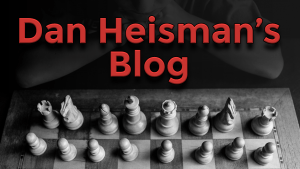Q&A with Coach Heisman Apr 26, 2013
Thanks to the Hatboro-Horsham High School Hall of Fame luncheon, I performed this show in suit and tie  .
.
There was a question or two about my involvement with the Kasparov-Deep Blue matches. Although I worked at both matches, I was only involved with the matches, and had nothing to do with the Deep Blue team or their preparation for the matches:
In the first match here in Philadelphia in 1996 I was the official scorekeeper for the International Computer Chess Association (ICCA; now the International Computer Game Association), which was putting on the match for the Association of Computing Machinery (ACM). My role initially was as official scorekeeper but eventually morphed into a key media liaison as I was physically situated with the media, and was well versed in both the computer and the chess sides.
The second match took place in New York City in 1997 and was completely organized by IBM. I volunteered for IBM, mostly in their VIP room where assorted GMs and I followed the match on closed circuit while sharing their hors d'oeuvres and explaining to the VIPs what was happening. In the final round I got to go up to the press box, where I hung out with GM Patrick Wolff and others, and got to see the dramatic (Kasparov basically re-iterating that he thought Deep Blue must have cheated while the Deep Blue engineering team gritted their teeth) post-match press conference and awards. For more on this match, I recommend Dr. Hsu's book Inside Deep Blue.
Someone asked me what was the main things I did to improve when I first started playing serious chess (at age 16). My answer was:
- Realize that there are threats in chess which, if allowed, cannot be met. Therefore, in most positions, one just can't make a move and then wait to see what the opponent does, and then try to meet it. If you do and they make an unmeetable threat, the game is over. So you have to consistently take your time and make sure that if your opponent has a forcing move (Check, capture, or threat) in reply to your candidate move that you have a safe answer - or else you probably need to discard that candidate. This takes time. Finding and preventing tactics before they occur is the single most important use of your tactical ability. I wrote about this in The Secrets to Real Chess and The Most Common and Important Use of Tactics. All my beginner misconceptions were addressed in this linked column.
- I joined one of the best chess clubs in Philadelphia, drove there each Friday evening, spent 5-8 hours there playing slow games and analyzing afterwards, getting a chance to analyze with some of the best players in Philadelphia. If they made a suggestion I was pretty sure to follow it or else they would not keep giving me that great free advice
 .
.
- * Playing for fun
- * Playing to learn and improve, and/or
- * Playing to win money, prizes, or titles
At the end of the show someone proposed a helpmate in two to solve, but their FEN notation apparently lacked the final characters. So instead I showed one that I had composed (in helpmates Black moves first and helps White to mate in the prescribed number of moves):
The answer is on the next line so stop reading here if you want to work on the problem.
Answer: 1...h1B 2.g8B Bb7 3.Be6#
Someone asked about the following opening sequence (click on the moves in the diagram below to get my updated, computer-backed commentary):
Links to references used during the show include:
- The World's Most Instructive Amateur Game Book
- Book: Studying Chess Made Easy (Soltis)
- Book: Chess Visualization Course (Anderson)
- Analysis and Evaluation
- Breaking Down Barriers
- The Self-Fulfilling Prophecy
- Reviewing Chess Games
- Annotated Game Collections vs Instructive Anthologies
Thanks again to all mods for helping control the chat channel. The next show on Friday May 10 (as always at 5-6:30 PM ET) will be open to all. Hope to see you then!



